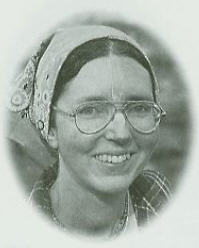
Hare Krsna Devi Dasi
AN OLD FILM, The Life and Times of Judge Roy Bean, recounts the life of a Texas folk hero who brought law and order to the Wild West. Armed with a hefty law book, Bean appoints himself judge of a rugged frontier town and sets up court in a bar. He reforms fighters and gamblers into law-abiding sheriffs and deputies who protect the citizens from marauders. The town prostitutes, properly married to the deputies, become pillars of propriety. The town is transformed.
The story appeals to our innate faith that all people have some special value, if only it can be cultivated. Our belief is correct. At the innermost core each of us is a pure spirit soul, a transcendental being with a unique contribution to make. Too often a person's lower nature obscures the higher nature. But with proper guidance, anyone's better nature can be evoked. For this reason Lord Krsna created an occupational therapy to cure us. It's called varnasrama-dharma.
According to the Bhagavad-gita, everyone acts under the influence of the three modes of nature: goodness, passion, and ignorance. The modes direct one to act as a brahmana (intellectual, teacher), a ksatriya (soldier, government administrator), a vaisya (farmer, merchant), or a sudra (laborer, craftsperson).
Everyone has a certain natural occupation. How can it be used to bring out his best character? Judge Bean's "ksatriyas" first used their martial power destructively as gang leaders but later transformed it as law enforcers. In a more recent example, several years ago the San Francisco sheriff's department set up a program that trained former drug dealers to grow crops for local restaurants. Their twelve-acre garden yielded 120 tons of produce per year.
In a TV interview, sheriff's assistant Catherine Sneed described the changes as inmates transformed from drug dealers to farmers: "I've had so many hardened crack dealers turn into someone who cares whether or not the roses have gotten just enough fish emulsion, or whether or not we're going to make sure they're pruned at the same time. I really feel like gardening teaches you to care."
Setting criminals into a new occupation uncovered the good within their character.
"Because of their criminal history," Ms. Sneed explained, "many of them have lost the sense that they can do something good. When they first come out to the jail program, most of them can't look you in the eye …, but gradually, as they're in the program for some time, they start walking up straight, and they're very excited about the spinach and potatoes. … I show them that just as we gave life to these vegetables, you can give a new life to yourself."
Few graduates return to crime. Most stay in gardening-related jobs.
The program transfers people from a contaminated vaisya occupation (merchant of illegal drugs) to a purer vaisya occupation (gardener). The sheriff has intuitively applied a varnasrama principle: purification of character by appropriate work. Reform by gardening would have failed with Judge Bean's gang leaders. But by targeting nonviolent drug dealers, authorities naturally selected people ofvaisya character, who were most likely to enjoy gardening.
Will the sheriff's success last? Unfortunately, he misses one important principle: the worker should dedicate his work to the pleasure of God. By working for God, the worker gains the highest perfection. Otherwise, the success of any job program can't endure.
Lord Krsna explains: "By following his qualities of work, every man can become perfect. … By worship of the Lord, who is the source of all beings and who is all-pervading, a man can attain perfection through performing his own work." (Bhagavad-gita 18.45-46)
Where can people of different character types be trained in the appropriate skill and learn to do that work as an offering to Krsna? At present, no such training institution exists. Srila Prabhupada greatly wished to establish varnasrama colleges all over the world, and the Krsna consciousness movement now plans to make Srila Prabhupada's desire a reality.
It will be challenging to assemble curricula, set up funding, and find qualified teachers in many disciplines. Still, varnasrama colleges hold the promise of spiritual progress for the whole world becausevarnasrama means to bring out everyone's best character by following the laws in Krsna's book, the Bhagavad-gita. Varnasrama is Krsna's occupational therapy to bring every type of person to the spiritual platform.
Hare Krsna Devi Dasi, an ISKCON devotee since 1978, is co-editor of the newsletter Hare Krsna Rural Life.
